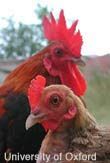Mystery of Empty Chicken Sex Solved

Many animals copulate now and then without the delivery of semen. The act is mysterious, because animal sex is thought to be driven solely by the need to reproduce.
Are they just fooling around?
New research suggests there's a deeper reason. Males, it seems, are insuring their bets by encouraging fidelity and thwarting biology.
Tommaso Pizzari at the University of Oxford and his colleagues studied feral chickens, which are known to be rather promiscuous. The hens aren't chicken when it comes to mating with several roosters.
For a male, that means sperm competition. If your favorite hen hangs out with several roosters, how do you know if you're the father?
Researchers outfitted one group of hens with a plastic device that prevented the fertilization of eggs. The other group had unprotected sex. Scientists watched their behavior on subsequent days.
Regardless of whether semen get in, mounting alone "drastically inhibits the propensity of a hen to mate with a new rooster," the scientists conclude. Further, when hens do mate again within four days in unprotected fashion, fewer sperm reach their goal, as some natural mechanism in the hen thwarts their travels.
Sign up for the Live Science daily newsletter now
Get the world’s most fascinating discoveries delivered straight to your inbox.
Roosters were noted mounting hens again after their initial encounter, which is assumed to have been a useful tactic in preventing other males from horning in on their efforts.
The study is detailed in the July 12 issue of the journal Current Biology.

